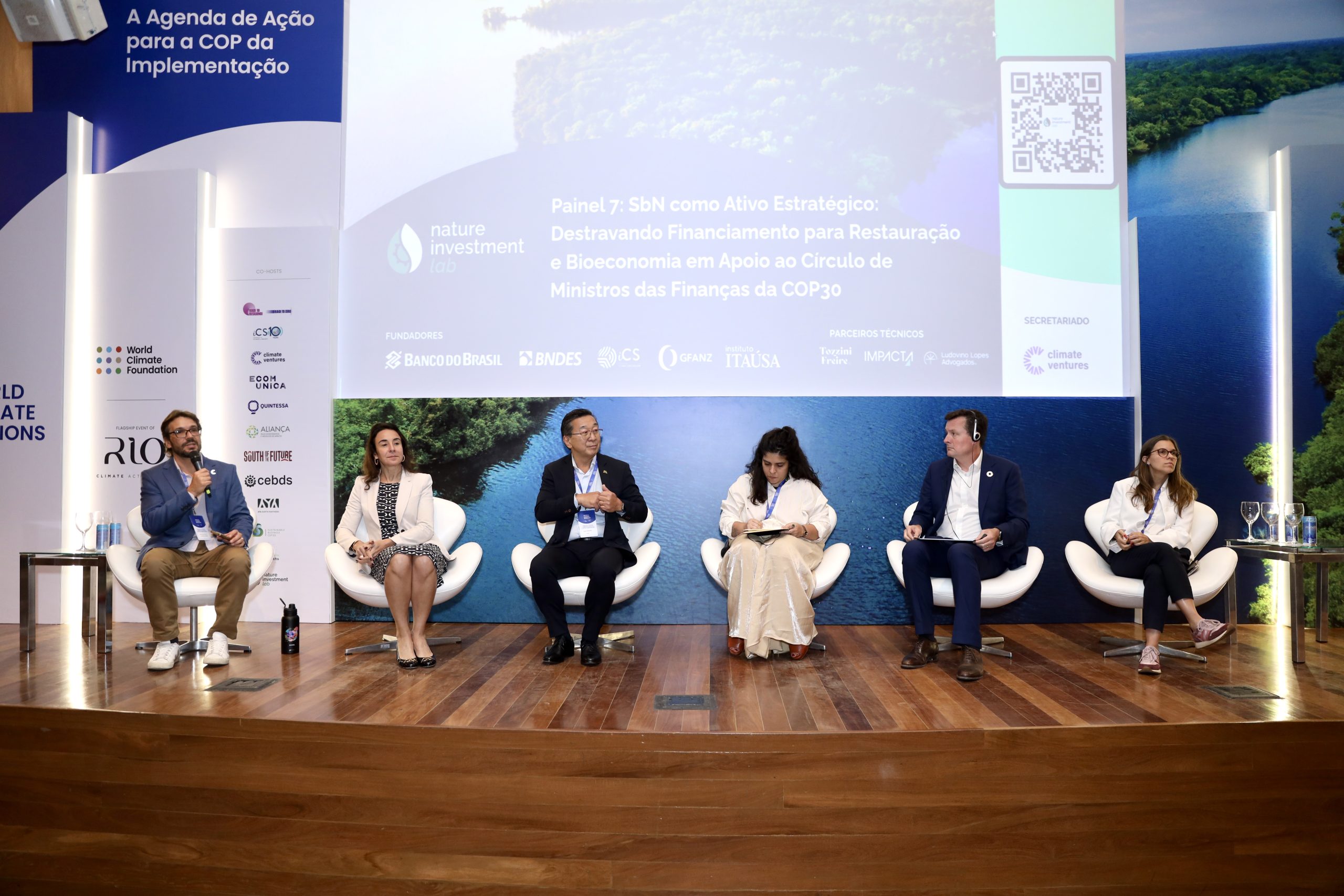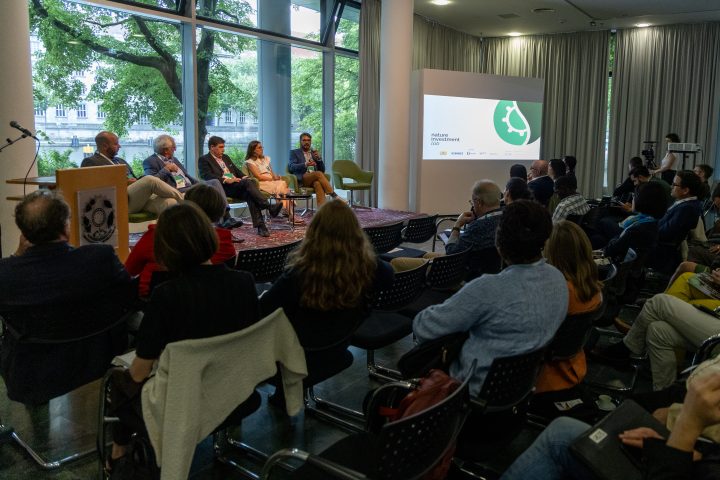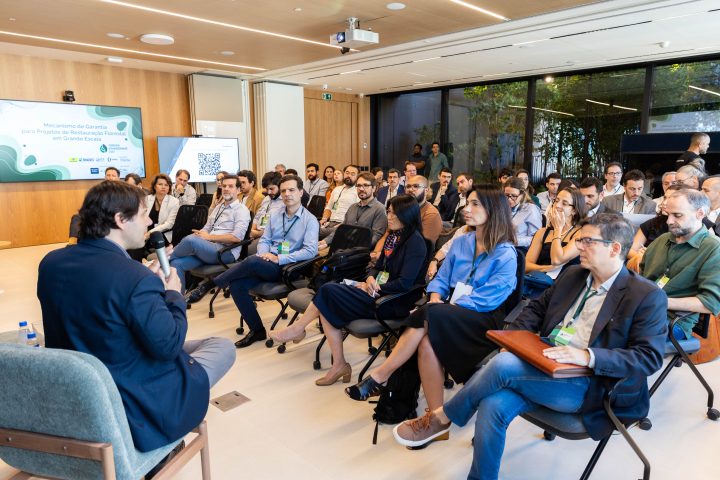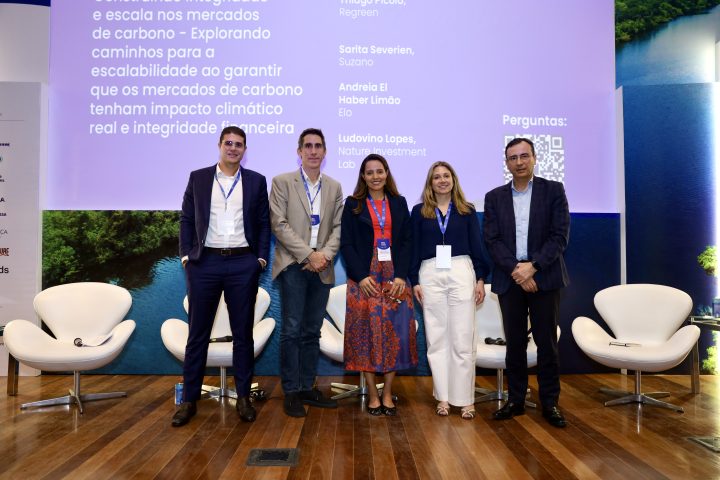Collaboration. This word set the tone for the discussions at the panel “Brazilian Benchmarks in Finance for Climate and Nature” during Rio Climate Action Week. Moderated by Daniel Contrucci, co-CEO and co-founder of Climate Ventures, the event focused on how to unite efforts and work in partnership to attract capital willing to finance the climate agenda.
Ambassador Tatiana Rosito, Secretary for International Affairs at the Ministry of Finance, stated that the Coalition of Finance Ministers for Climate Action has benefited from direct contact with capital markets, multilateral banks, and civil society representatives. The group, which already includes representatives from 37 countries, international organizations, and advisory teams, was created specifically to discuss ways to increase global climate finance.
“We want finance to be a solution, not a bottleneck. Integrating different structures is something very special, and it’s even more important when talking about Nature-based Solutions (NbS). The risks are more diffuse; we don’t control nature. We need to know it better, respect it, and give back what we receive,” said Rosito, adding that only a “virtuous circle” will make the necessary $1.3 trillion per year for climate finance in developing countries a reality.
Contrucci mentioned that the Nature Investment Lab (NIL)—for which Climate Ventures serves as the secretariat—works precisely to unlock investments in NbS in Brazil. Launched in 2024, NIL operates through task forces to overcome regulatory barriers, develop replicable business models, and create innovative financial structures for these projects. It has also been collaborating on the design of the next auctions for Eco Invest, a federal government program to mobilize private capital to finance ecological transition projects.
“The new NbS market often operates in a way that the traditional financial market cannot absorb. The investment timeline is longer, and it involves carbon credits and area restoration. There is a lack of adequate structures to finance these risks,” he said.
For Natalia Cerri, a manager at Instituto Itaúsa—one of NIL’s founding members—the great challenge is to “make it happen” by influencing decision-making processes to unlock resources for NbS: “We need to maintain a collaborative stance, actively listening to the field, participating in these processes, and staying connected with other initiatives that are emerging,” she said. “NIL is a meeting point to bring together different efforts. It is an orchestration.”
Another panelist, Carlos Takahashi, a director at the Brazilian Association of Financial and Capital Market Entities (Anbima), was even more emphatic. He stated that it is necessary to bring science and academia closer to the financial market, changing the way climate challenges are viewed. Furthermore, he added that it is essential to talk with investors to understand what is missing to attract them: “This conversation is essential, and it’s not simple or trivial. Often, incentives and benefits are created in the wrong place. But the capital markets also have other lessons to learn. It’s not on Faria Lima [Avenue] that you will find market solutions or attract investors for projects in the Amazon or even in a favela, a hundred meters from the avenue. We still don’t see how to make this community viable.”
“Finance always flows from the big to the big,” added Martha de Sá, founder of Violet and co-founder of Vert, both focused on enabling investments in impact businesses. In her speech, the executive said that 80% of producers in Brazil have never had access to credit lines, likely because they do not meet the requirements of the National Program for Strengthening Family Farming (Pronaf): “It is necessary to ensure the financial inclusion of small producers and, by doing so, help them avoid deforesting areas. It’s a win-win on all sides, and that’s the beautiful part of NbS. We have to gain scale and speed. We need to think beyond blended finance, with public policies and regulatory instruments to promote incentives.”
Jamie Fergusson of the International Finance Corporation (IFC) stated that Brazil has a great opportunity to lead the nature finance market. According to him, the IFC—the arm of the World Bank focused on private sector development in developing countries—has already invested $25 billion this year in climate finance, but it is necessary to attract concessional money for the public and private sectors—and the only way to do that is with commercial-scale projects.
“The sustainable finance market can grow a lot. But it is necessary to reduce transaction costs,” he affirmed.



